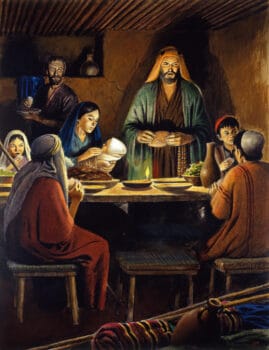A week-long evangelistic series held at the Kerevat National School of Excellence (KNSoE) in East New Britain, Papua New Guinea, concluded with 11 student baptisms and a renewed interest in the Adventist message among students and staff. Organized… Source: https://adventist.news/news/evangelistic-program-papua-new-guinea-leads-to-baptisms-renewed-spiritual-interest
Saturday, July 27 7PM – Bob Cundiff, DMi “The Great Controversy and You” (BC Camp Meeting 2025)
Monday: Healing the Body
Daily Lesson for Monday 28th of July 2025
Read Exodus 12:1-20. What specific instructions does God give to Moses and Aaron before Israel leaves Egypt?
One would expect God to instruct Moses and Aaron about how to organize the departure from Egypt: that is, how to make provisions for the escape, especially for the elderly, mothers with small children, animals, and so forth. Instead, God’s instruction is surprising: He tells them how to celebrate the Passover. In other words, the focus is on worshiping the Lord, who was going to redeem them. Everything else would follow in due time.
Each family was to prepare a lamb, with nothing wasted. Everyone had to eat his or her portion, and if the family could not consume the entire lamb, they were to eat the meal together with another family.
Read Exodus 12:13-14. What was the Lord going to do for them when the final plague came? What does all this symbolize?
The Exodus was to be celebrated regularly each year, not merely as a commemoration of a past event of what God had done for their forefathers but also as the actualization of God’s liberating act for the present generation. This was to be a fresh experience for each group.
Verses 12 and 13 explain the meaning of the Passover: the divine judgment of destruction will “pass over” the Israelites; thus, they were to commemorate “Passover.” This word is a combination of two words, “pass” and “over,” because the destruction “passed over” the Israelite homes on which the doorposts had been marked by the blood of the lamb, the sign of life and salvation. In Hebrew, the name of Passover is Pesach, from a verb that means “to pass over.”
The celebration of the Passover was to remind every Israelite of the mighty and gracious acts of God on behalf of His people. This celebration helped to secure their national identity and seal their religious convictions.
|
Why is it so important always to remember the good that God has done to you in the past and to trust that He will do good for you in the future, as well? |
 (0)
(0)Sunday, July 27 6:30AM – Leonardo Barbosa (BC Camp Meeting 2025)
God First: Your Daily Prayer Meeting #1066
"If you believe, you will receive whatever you ask for in prayer" (Matthew 21:22, NIV).
Tag someone in need of prayer, and kindly share your prayer requests here:
https://wkf.ms/3DBuapQ Source: https://www.youtube.com/watch?v=kY8T2rUDcXA
20200620 04
20200613 03
20200626 01
20200620 01
20200619 01
- « Previous Page
- 1
- …
- 290
- 291
- 292
- 293
- 294
- …
- 4858
- Next Page »


